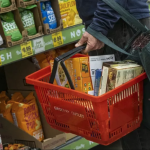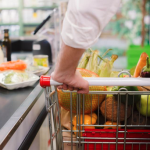NSP
May 19, 2025
UW project took nuisance seaweed from shellfish farm to help growers. The USDA cut its funding

Seaweed is a problem for shellfish growers. One UW project hopes to turn the nuisance seaweed, like this one at Baywater Shellfish in Hood Canal, into nutrients for farm soil. In its first year, the team harvested nearly 17,000 pounds of wet seaweed. Project Director Sarah Collier says there was so much interest that they…
May 16, 2025
Understanding your food’s expiration dates and preventing waste

Anne Lund, registered dietitian and director of the Graduate Coordinated Program in Dietetics at UW, speaks with KIRO TV about food expiration dates. Lund advises that the expiration date is only part of the puzzle and some foods may expire before or after the date because it comes down to how the food was handled.
May 7, 2025
Educators offer strategies for implementing weight-inclusive approach in dietetics training

A new paper published in the Journal of Nutrition Education and Behavior, co-authored by University of Washington School of Public Health faculty member Cristen L. Harris, offers practical strategies for program directors and educators to use as a framework for incorporating weight-inclusive approaches into their dietetics education programs. These recommendations follow another paper Harris co-authored…
April 29, 2025
Navigating unhealthy food culture on college campuses

Michelle Averill is interviewed by a first year UW student and offers advice for healthy eating choices as a busy college student. She offers advice to think ahead and identify which food feel the most nourishing to you. This article appears in a series contribution by Washington youth through The Seattle Times Student Voices project.
April 8, 2025
MPH-Nutrition student work highlighted at practicum symposium

Six Master of Public Health Nutrition (MPH-Nutrition) students will participate with over 100 other MPH students from the University of Washington School of Public Health in the 2025 MPH Practicum Symposium on April 9, 2025. The event showcases student work and the significant contributions students, faculty mentors, and community partners have made in many real-world…
March 24, 2025
Inspiring food curiosity with preschoolers for health equity

MPH student Karen Krol created recipes to introduce young children to healthy local Washington foods.
February 26, 2025
The power of in-person dietetics mentoring

For registered dietitian nutritionists (RDNs) in training, one of the most valuable connections to form is with a mentor. While virtual resources and online networking have their place, face-to-face mentorship provides unique benefits that can shape a dietetic student’s path to becoming a successful dietitian.
February 25, 2025
Gobsmacked by groceries, Inflation inching higher for Washington consumers weary at the market

The Spokesman Review highlights both the national trends of food costs, as well as Washington state trends, pointing to a report released in February from the Washington State Food Security Surveys, showing that state residents continue to worry about food prices.
UW, WSU study shows WA residents struggling to pay for one particular monthly expense

This article by the Bellingham Herald highlights findings from the fifth edition of the Washington State Food Security Survey released on Feb. 13, revealing a potential rise in food insecurity in Washington.
Grocery prices are a top financial worry, WA residents say

The Seattle Times looks at the growing high cost of food for Washington households, citing a state-wide survey conducted by UW Food Systems researchers called WAFOOD. FSNH faculty member Marie Spiker is quoted, “Of all the indicators that we have of how are households doing financially, food insecurity is a really important one, because it…
Previous page Next page